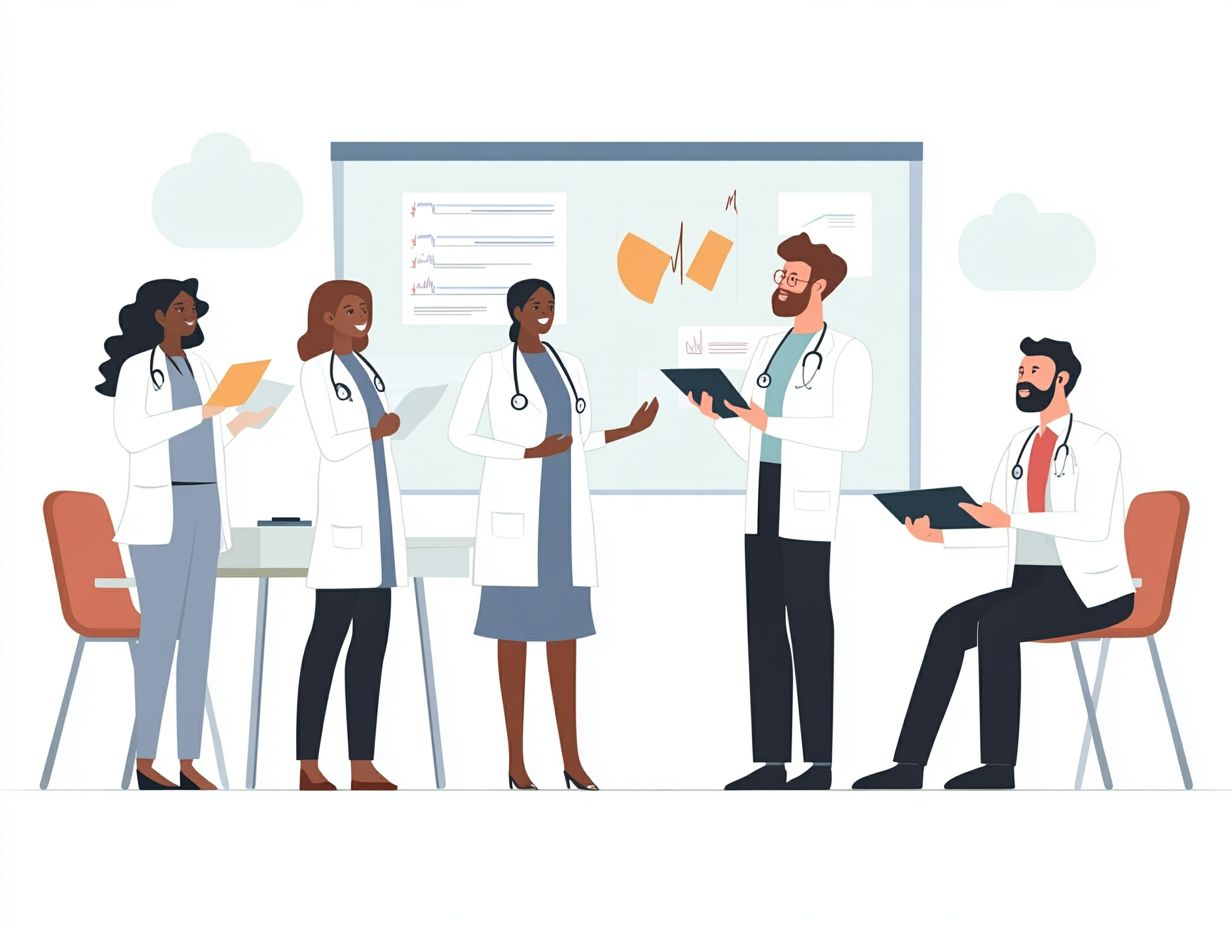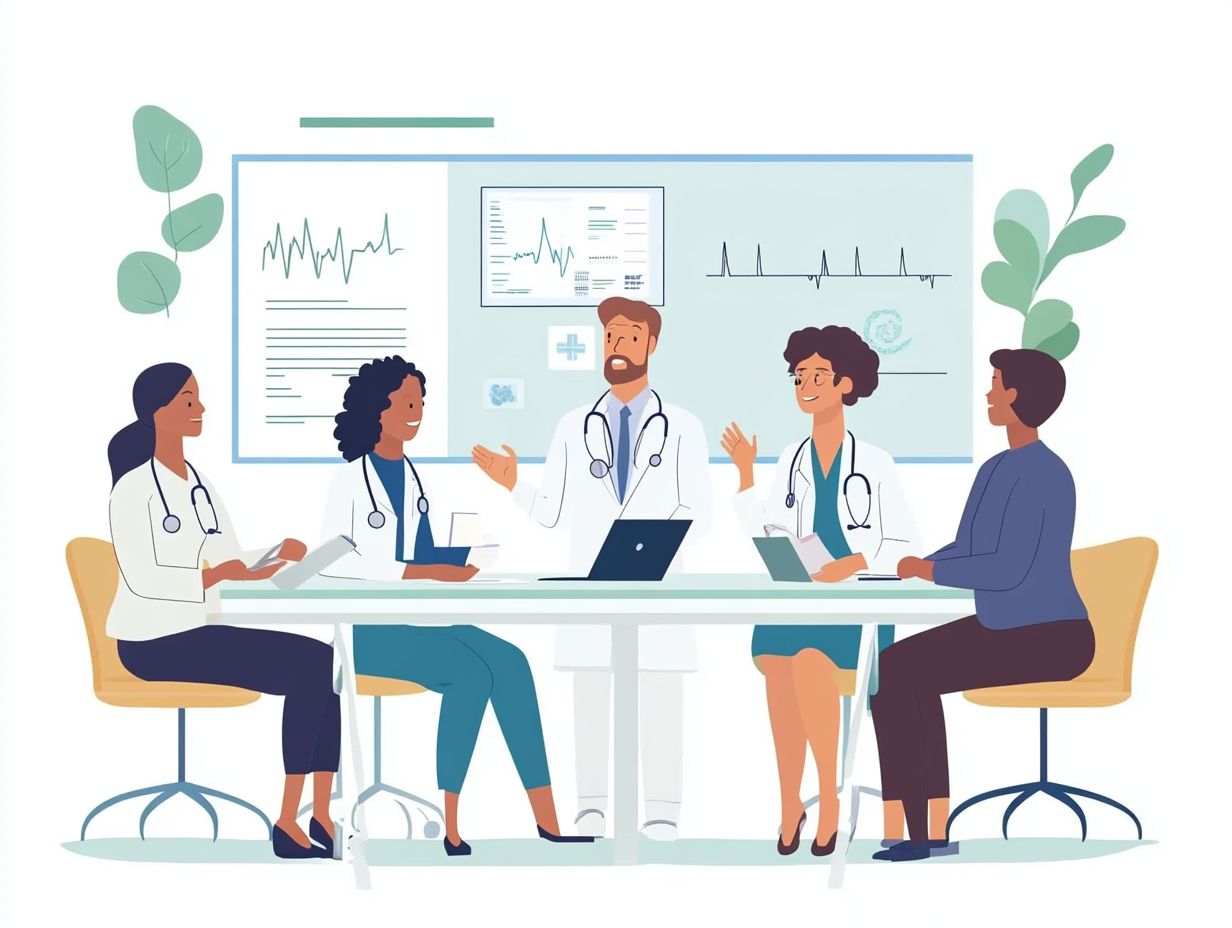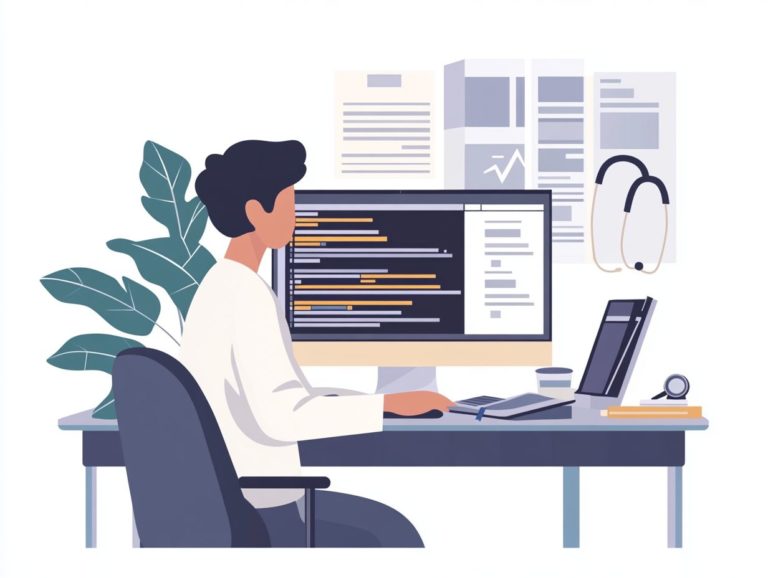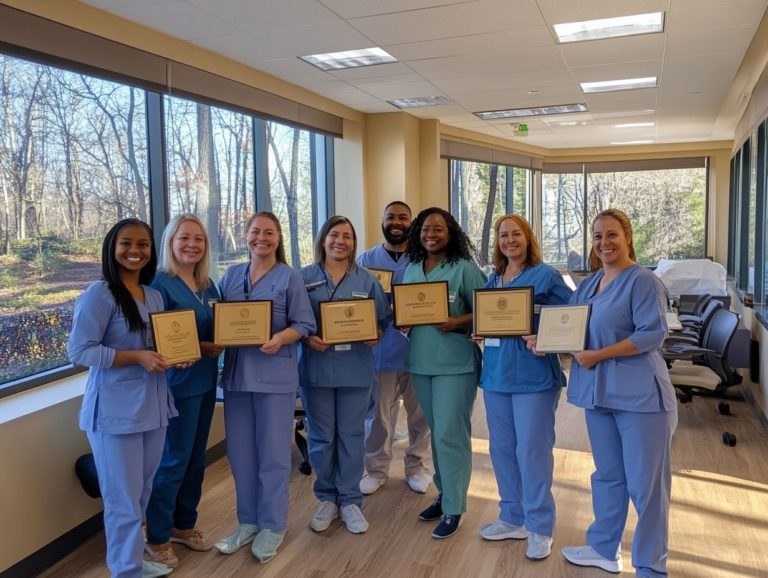The Importance of Continuing Education in Healthcare
Continuing education in healthcare is your ticket to success! It is crucial for professionals like you who want to remain at the cutting edge of this constantly evolving field.
This article delves into the importance of continuing education, showcasing its many benefits, including improved patient outcomes and enhanced career opportunities. It also examines the diverse range of programs available, from online courses to hands-on workshops, while addressing essential licensing and certification requirements.
Explore effective strategies to keep yourself informed about the latest developments in healthcare, ensuring that you remain a knowledgeable and competent practitioner.
Contents
- Key Takeaways:
- What is Continuing Education in Healthcare?
- Benefits of Continuing Education for Healthcare Professionals
- Types of Continuing Education Programs in Healthcare
- Continuing Education Requirements for Healthcare Professionals
- How to Stay Updated with the Latest Developments in Healthcare
- Frequently Asked Questions
- What is the importance of continuing education in healthcare?
- How does continuing education benefit healthcare professionals?
- What are the consequences of not pursuing continuing education in healthcare?
- What are some common methods of continuing education in healthcare?
- Is continuing education mandatory for healthcare professionals?
- How can employers support continuing education for their healthcare staff?
Key Takeaways:

Continuing education is your path to staying updated with the latest developments in healthcare. It not only benefits patients by improving outcomes but also opens up career opportunities for you.
Various types of continuing education programs are available, including online courses, conferences, and workshops. These programs allow you to gain new knowledge and skills conveniently and accessibly.
To maintain your licenses and certifications, completing a certain number of continuing education hours is required. This ensures you are up-to-date with your knowledge and skills, ultimately benefiting patient care.
What is Continuing Education in Healthcare?
Continuing education in healthcare encompasses the professional development activities that you, as a healthcare professional whether a registered nurse or a medical practitioner pursue to maintain your licensure, deepen your knowledge, and stay aware of best practices in patient care.
This ongoing learning is vital in the fast-paced healthcare environment, where emerging technologies and proven methods based on research constantly reshape medical training and nursing education.
Benefits of Continuing Education for Healthcare Professionals
Continuing education presents a wealth of advantages for healthcare professionals like you. It elevates patient care, refines your skill set, and unlocks greater career advancement opportunities.
Participating in continuing education helps you gain essential skills and knowledge. You not only acquire advanced knowledge of medical terminology and proven methods but also establish yourself as a leader in the healthcare field.
This approach helps you adapt easily to emerging technologies and the ever-evolving demands of healthcare.
Improving Patient Outcomes
One of the primary benefits of pursuing continuing education in healthcare is the remarkable enhancement in patient outcomes, achieved through the use of proven methods and the latest medical research.
By consistently updating your skills and knowledge, you position yourself to implement advanced techniques that elevate patient care and cater to the unique needs of diverse populations.
For instance, courses centered on culturally competent care and communication skills enable you to understand and connect with patients from various backgrounds.
Training in areas like pain management, mental health support, and chronic disease management equips you to tackle the evolving challenges within the healthcare landscape, ultimately leading to improved treatment strategies and heightened patient satisfaction.
Advancing Career Opportunities

Continuing education is essential for advancing your career opportunities in the healthcare field. It enables you to pursue specialized roles and obtain relevant certifications that enhance your qualifications.
By participating in various online courses and seminars, you can acquire the latest knowledge and skills, enhancing your competitiveness for sought-after job positions. These educational experiences arm you with advanced techniques and insights while paving the way for promotions and higher salaries.
As the healthcare landscape continues to evolve at a rapid pace, embracing lifelong learning becomes increasingly vital. Don t miss out on the latest advancements start your journey today!
Types of Continuing Education Programs in Healthcare
You ll find a rich array of continuing education programs in healthcare, from online courses to seminars and conferences, all designed to meet the diverse needs of healthcare professionals eager to enhance their knowledge and skills.
Whether you prefer the flexibility of online learning or the collaborative environment of in-person events, there s something that will suit your aspirations in advancing your career.
Online Courses
Online courses have emerged as a highly sought-after option for healthcare professionals, thanks to their flexible format that effortlessly accommodates your busy schedule. This enables you to enhance your skill set and broaden your knowledge base with ease.
As the healthcare landscape continually evolves, numerous platforms present a wide array of specialized online courses designed for diverse fields such as nursing, public health, and medical coding. These programs equip you with essential skills and ensure top-notch quality!
Engaging in accredited online learning for your continuing education is a crucial resource for anyone looking to stay abreast of industry standards and advancements. You can learn at your own pace, allowing you to access materials whenever it suits you.
This fosters a self-paced approach that can deepen your understanding of even the most complex subjects.
Conferences and Workshops
Conferences and workshops offer invaluable opportunities to network, get hands-on medical training, and stay updated on the latest advancements in the healthcare industry.
These events serve as a direct platform for interacting with industry leaders, allowing you to gain insights into cutting-edge research and innovative technologies shaping the future of patient care.
By participating in discussions and workshops, you can learn best practices to implement in your own environment, ultimately improving healthcare outcomes.
Such gatherings foster an atmosphere of collaboration and shared learning, contributing to your ongoing professional development and growth within the field.
Interacting with colleagues from around the world broadens your perspective and enriches your approach to the challenges you face in daily practice.
Continuing Education Requirements for Healthcare Professionals

Continuing education requirements for healthcare professionals are vital for maintaining licensure and ensuring that providers consistently meet the educational standards established by regulatory bodies.
Engaging in ongoing learning not only upholds your credentials but also enhances the quality of care you deliver, keeping you at the forefront of advancements in the field.
Licensing and Certification Requirements
Healthcare professionals must complete a specific number of continuing education (CE) credits to maintain their licenses and certifications, with requirements varying by state and specialty. This commitment ensures you remain informed about the latest advancements in medical science, technology, and ethical practices.
For instance, as a nurse, you typically engage in ongoing education tailored to your specialty, often balancing classroom hours with practical training. Similarly, physicians are usually required to participate in accredited training programs, which not only enhance their clinical skills but also deepen their understanding of medical ethics.
This focus on continuing education is a crucial aspect of your professional development. It directly influences your competence, job prospects, and ability to comply with ever-evolving healthcare regulations.
How to Stay Updated with the Latest Developments in Healthcare
Staying updated with the latest developments in healthcare is essential for you as a professional aiming to remain competitive and deliver exceptional patient care.
You can achieve this by engaging with various professional organizations and utilizing a wealth of resources available at your fingertips.
Start your continuing education journey today and elevate your career!
Utilizing Professional Organizations and Resources
Professional organizations in the healthcare industry provide you with an abundance of resources and networking opportunities to keep you well-informed about the latest trends and innovations.
Entities like the American Nurses Association and the American Medical Association are important for your career. They grant you access to a diverse array of educational resources, such as webinars, workshops, and peer-reviewed publications (research articles reviewed by experts in the field), which help you continuously improve your skills and knowledge.
The networking opportunities available through conferences and local chapter meetings enable you to collaborate and connect with your peers, fostering shared insights and experiences.
The certifications offered by these organizations not only validate your expertise but also encourage a steadfast commitment to lifelong learning. This ensures you stay at the forefront of your field.
Frequently Asked Questions

What is the importance of continuing education in healthcare?
Continuing education is essential for your career growth! It helps healthcare professionals stay updated with the latest advancements, techniques, and best practices in the ever-changing healthcare industry.
How does continuing education benefit healthcare professionals?
Continuing education allows healthcare professionals to acquire new skills and expand their knowledge. This ultimately enhances their critical thinking and problem-solving abilities.
What are the consequences of not pursuing continuing education in healthcare?
Not pursuing continuing education can lead to outdated knowledge and skills, which can have serious consequences for patients. It can also hinder your career growth and limit opportunities for professional development.
What are some common methods of continuing education in healthcare?
Common methods include attending conferences, workshops, and seminars, taking online courses, participating in webinars, and completing self-study modules. These options provide flexible learning opportunities.
Is continuing education mandatory for healthcare professionals?
Continuing education requirements vary by profession, state, and employer. While some organizations may have mandatory requirements, it is highly recommended for all healthcare professionals to pursue education to maintain competency and stay updated.
How can employers support continuing education for their healthcare staff?
Employers can support continuing education by providing financial assistance and offering flexible work hours. Promoting a culture of learning and encouraging attendance at conferences can also greatly benefit staff development.
Don t miss out on the chance to enhance your skills! Start your continuing education today!






